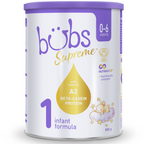7 Sustainable Parenting Tips
As a new parent, you’ve probably noticed just how much stuff babies need. And as they grow and their needs (and clothing size!) change, you’ll find yourself getting rid of the old stuff to make way for new. It’s almost like the littlest people on the planet are the largest super consumers.
Luckily, there are ways to raise your children to be happy, healthy, and well cared for, without leaving such a big environmental footprint. This is called sustainable parenting, or green parenting. There are plenty of eco-friendly tips and tweaks you can put into action across all aspects of your household—from feeding and food prep to clothing and toys, that will reduce waste in your home and even help others do the same. Here are some helpful tips on how to be more sustainable and ideas to get you into an eco-parent groove.
1. Switch to a Solid Baby Wash
So many natural, gentle baby washes that seem perfect for baby skin come packaged in plastics—which is not perfect for the environment. Make the switch to baby-specific solid body washes with equally gentle ingredients, and you’ll be reducing your household’s plastic waste (not to mention saving on storage space—an added bonus!).
2. Join a Local Community Group
Sure, you could store outgrown infant car seat, swing, or crib in the attic for your sibling/cousin/best friend to use for their child one day—or you could post it in a local community group and let someone else get use out of it right away (before safety standards inevitable change). While you’re there, check to see if there’s anything you might need for your little one—like a sit-up seat or travel stroller.
3. Banish Baby Wipes
True, this is easiest to do from Day One, so that you and your infant never get used to them. But it’s a worthwhile—and doable—tip for everyone, at any age. The fact is, many wet wipes contain plastic, and even those that don’t still contribute to the landfill (where they don’t actually biodegrade). Instead, keep a stack of soft cotton or bamboo cloths that you can dampen with water, then machine wash as needed.
4. Start a Neighbourhood Swap
Just as your baby is outgrowing 0-3 month clothing, someone else’s child might be moving on from 3-6 month sizing. Encourage sustainable parenting neighbourhood wide and get a group of parents with kids of varying ages together, and you’ll all benefit from those miraculous growth spurts that seem to happen overnight. (The one exception: The parent with the oldest/biggest kid. Maybe chip in on a gift certificate for new clothes for their child!)
5. Prioritise Earth-friendly Packaging
More and more baby care brands are packaging their products in recyclable and compostable packaging, recycled materials, or sustainable ones such as aluminium, bamboo, and glass.
6. Buy Clothes With the Next Baby in Mind
Whether yours, or someone else’s! Gender-neutral clothing has twice the potential of being passed along to another child (or two, or three…). We’re not saying boys can’t wear pink and girls can’t wear blue—of course they can! But if you steer clear of items with too many ruffles and bows, or ones that say “Dad’s favourite guy,” you’ll be able to pass along the wardrobe even if Dad’s expecting a favourite girl this time around.
7. Repurpose Containers
Before tossing containers of any kind into the recycling bin, think of whether you can use them in your home. Bubs’ formula tins make a great holder for nappy pins, dummies, and other small baby gear. Baby food jars make sweet bud vases or paper clip organisers. Disposable nappy boxes are ideal for storing books your baby has outgrown so you can easily pass them along to some other young “reader.” Once you approach every emptied object with this mindset, you’ll be amazed at how many new uses you can envision. You can also look for biodegradable Tupperware or reusable food pouches.
Making small changes to your lifestyle and purchasing behaviours can help create sustainable parenting habits that really make a difference. These eco friendly parenting tips are a great starting point for parents trying to make a conscious effort to minimise their environmental footprint. Why not try implementing a few in your daily routine?


